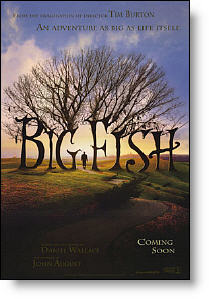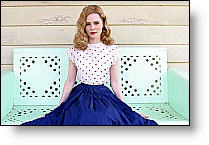Interview with the cast, producers and writer of “Big Fish”
by Chris Monroe
Staff Writer
See our review of “Big Fish”
Talking with the actors, producers and writer for “Big Fish” in New York City helped expose some relevant personal stories and experiences, as well as the thoughts and ideas behind making the film. Those in attendance were actors Alison Lohman, Danny DeVito, and Steve Buscemi, screenwriter John August, producers Dan Jinks and Bruce Cohen, and producer Richard D. Zanuck.
Alison Lohman (“White Oleander,” “Matchstick Men”) was the first of all of the actors interviewed to express an interest in this project because of the involvement of director Tim Burton. Lohman says she would have done any script, at this point in her career, for the chance to work with Burton. But twenty-four year-old Lohman also emphasized that the script itself was a draw for her.
Lohman thinks the story of “Big Fish” is great, and says she hasn’t really seen a script like it. “It’s about the beauty and the magic and the mystery of telling stories, passing it on, generation to generation. There aren’t too many movies about that.” She finds it an interesting piece, too, because of the combination of two different worlds; the contemporary being reality, and the past being fantasy.
About the love story in “Big Fish”, of which her character is central, Lohman views the romance as more idealized. She relates it to fairytales fathers would tell their daughters, like Cinderella, which always have a happy ending. She believes we need those kinds of stories because, as she put it, “There has to be some kind of hope.” In light of this, she refers to her parents who have been together for twenty-five years. “They’ve made it, and they’re very happy.”
Everyone, according to Lohman, has asked her if she has learned anything or grown in some way by working on this film. She states that we’re always learning and growing, but we don’t always realize it. It’s more subconscious. However, one thing she does take away from her experience is “the hope that love can be that strong.powerful, and forever.”
As with Lohman, the biggest draw to working on “Big Fish” for actor Danny DeVito (“One Flew Over the Cuckoo’s Nest”, “Taxi”, “Batman Returns”) was the director. “Tim Burton is like the man behind the curtain,” DeVito says. “I got the script, and I loved the script, but knowing that Tim was directing, I knew it was going to be even more of a special experience. Unique. Always magical, always whimsical.” DeVito describes this film as a wonderful piece about getting to know your father.
Another reason DeVito says he did the movie is because, “It triggers so many different emotional things that are so wonderful and personal to all of us.” DeVito saw the film twice before the interviews and said that he was flooded with emotion each time. As he was watching it, he was mentally going down different avenues with his father and reliving past experiences. “When I watch the movie, my father is with me through the picture. It’s just so strong. It brings back so many memories of my dad, and I think it’s going to have that affect on a lot of people, especially your relationship with your ‘daddy.’”
Steve Buscemi (“Trees Lounge”, “Fargo”, “Ghost World”), also referring to his father, says that that time together is precious. For him, the saddest part of this film is when Will’s character doesn’t talk to his dad for three years. Buscemi considers himself fortunate to have both of his parents still living. As he watches the film he realizes even more that his parents are not going to be around forever, and now is the time to keep the relationship strong.
One the other side, Buscemi, also a family man, describes his relationship with his son. In light of the subject matter of “Big Fish”, he says, “I think of stories as gifts. I used to tell my son stories when he was a kid, and he loved hearing them. It was a great way for he and I to very simply spend time together and communicate in a way where it wasn’t me asking him, ‘How was school today?’”
Discussing the father/son relationship and storytelling with producer Bruce Cohen (American Beauty) brought some understanding to the philosophy behind producing this film. One of the beautiful things of “Big Fish”, Cohen says, is how it presents two different viewpoints. “It was Edward’s view of how to be a good father, versus his son’s idea and how that was received. Edward’s whole point is that these stories weren’t meant to be taken literally.” Essentially, Cohen believes that the character of Edward was trying to be a good father by imparting to his son what he had learned about the world. Instead of retelling events from his life as they actually happened, he was giving him spiritual and emotional truths about how to live his life.
Furthermore, Cohen explains what would be a “bad” story for a father to tell. He says, “I think parents have a tremendous responsibility to their children which, many times in today’s society, is taken way too lightly. Every story you tell your children will be received on so many levels. Even before they can speak, they’re learning and gathering. A “bad” story would be any story that’s not going to give them the right message, or not going to reflect your personal viewpoint on how you should live your life.”
Speaking of truth and storytelling, screenwriter John August (“Go”, Charlie’s Angels: Full Throttle) describes the exchange that is happening between father and son in “Big Fish”. The character of Will (who is an invention of August for the screenplay) is a journalist who deals with hard, cut-and-dry facts—the opposite of Edward. Interestingly, there is nothing Will can actually prove about his dad’s outrageous stories. “It’s the contrast between and intellectual truth and an emotional truth. The flavor of what Edward is saying is more honest than if he had just literally told him, “These are the events of my life.”
Responding to the question of what “Big Fish” has to say regarding the idea of “belief,” August says, “I think belief incorporates the idea of faith, and that the things that you can’t actually, physically verify still have meaning, still have a truth to them.” [August has provided here a wonderful illustration of what it is like to put your faith in Christ. In an age when people doubt the validity of Jesus Christ, here is a great explanation of believing without seeing. Who Jesus is and claimed to be is still true and meaningful, even if you’re not able to go back two thousand years and witness his life first-hand for yourself. See our section about Jesus Christ to learn more.]
Referring again to Edward Bloom’s character, Cohen interprets the simplicity, and yet the profoundness of what he represents.
“Edward Bloom was a regular, normal, average guy. He wasn’t the president of the United States. He wasn’t a movie star. He wasn’t a sports hero. He wasn’t even necessarily a successful businessman. On the surface he may be dismissed by others as someone who didn’t leave a lasting contribution, but that’s not how he looked at it. That’s not how other people who knew him felt about him. I find it inspiring in that way that we each have our own unique, individual contributions we can make and legacies we can leave.”
In light of all of the fantasy and exaggerated aspects of “Big Fish”, may viewing it also prove to be an inspiration for family relationships and communicating what is most important.
Read our review of “Big Fish” (the movie).

